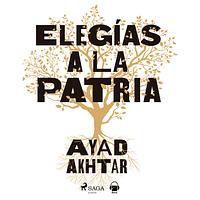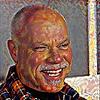Take a photo of a barcode or cover
Homeland Elegies as a book cannot be bracketed into any genre. It is all of it and more. It is a novel, it is a memoir, autofiction, autobiography, metafiction, non-fiction, and maybe even more. Whatever it is, it is a brilliant book of so many ideas, thoughts, emotions, and how a country once great and known for inclusion has cracked, slipped, and torn at its seams.
The book is about immigrants, their children, and the idea of America. Akhtar’s parents moved to America from Pakistan in 1968. His father took to America like a fish to water. His mother did not. She forever mourned the loss of home. His father, a surgeon loves America for what it is, and believes things will get better (post 9/11 and more). The book is about Akhtar’s life – a kid from Wisconsin, a writer struggling in New York, rubbing shoulders with the greats and yet not fitting in. The book is about so many nameless immigrants, and also the ones that Akhtar interacts with, who are scared about their children’s future in the land of great and plenty.
It is a story of a father and his son and how they both view home differently. Homeland Elegies speaks of so much, there is so much contained in one book – immigration, identity, home, politics, the arts, and decline of hope, though trying very hard to make sense of what goes on with optimism.
Akhtar’s writing is candid, vibrant, introspective, and a brilliantly sketched portrait of a family in a fractured land. I loved the fact that as a reader you don’t realize what’s fiction or fact in this book and honestly, after the first ten pages or so I stopped thinking about that. All I cared about is where the story was taking me, and it took me to all the right places about an unhinged country and its people.
The book is about immigrants, their children, and the idea of America. Akhtar’s parents moved to America from Pakistan in 1968. His father took to America like a fish to water. His mother did not. She forever mourned the loss of home. His father, a surgeon loves America for what it is, and believes things will get better (post 9/11 and more). The book is about Akhtar’s life – a kid from Wisconsin, a writer struggling in New York, rubbing shoulders with the greats and yet not fitting in. The book is about so many nameless immigrants, and also the ones that Akhtar interacts with, who are scared about their children’s future in the land of great and plenty.
It is a story of a father and his son and how they both view home differently. Homeland Elegies speaks of so much, there is so much contained in one book – immigration, identity, home, politics, the arts, and decline of hope, though trying very hard to make sense of what goes on with optimism.
Akhtar’s writing is candid, vibrant, introspective, and a brilliantly sketched portrait of a family in a fractured land. I loved the fact that as a reader you don’t realize what’s fiction or fact in this book and honestly, after the first ten pages or so I stopped thinking about that. All I cared about is where the story was taking me, and it took me to all the right places about an unhinged country and its people.
An exceptional book! The passage on the Reagan era was so good I listened to it three times.
This is a dizzying book. Before taking it on, I'd advise a reader to check out an interview (like the one on Fresh Air) with Akhtar. Reality and fiction blur frequently in this novel. In one paragraph you're reading a description of American politics that you know is true and the next, the story of a health care corporation that does not exist, but you suspect does under another name.
Akhtar suggests that this mix of fact and fiction is what it's like being from another culture. You never know where you stand. Tellingly, his father (a doctor who immigrates from Pakistan) ends up returning, while the son (brown-skinned and visibly recognizable as "other") sees America as home.
Akhtar's insights into capitalism, the attractions of fame, racism, and the destruction of middle America are not necessarily new, but they're given a very personal voice in this book that cannot be ignored.
While the book isn't perfect: there are changes of tone that are sometimes jarring; it is compelling, and I would encourage anyone serious about trying to decide what this country should or will become to read it.
Akhtar suggests that this mix of fact and fiction is what it's like being from another culture. You never know where you stand. Tellingly, his father (a doctor who immigrates from Pakistan) ends up returning, while the son (brown-skinned and visibly recognizable as "other") sees America as home.
Akhtar's insights into capitalism, the attractions of fame, racism, and the destruction of middle America are not necessarily new, but they're given a very personal voice in this book that cannot be ignored.
While the book isn't perfect: there are changes of tone that are sometimes jarring; it is compelling, and I would encourage anyone serious about trying to decide what this country should or will become to read it.
So, I hated the first chapter of this book, but from then on, it was interesting - I liked the fact that I couldn't tell what was fiction based on fact and what was fiction based on fiction. Nice.
A compelling read, with a number of uncomfortable situations and ideas that provoke reflection. Despite the work required, the author has a way of making the read seem easy. Recommend.
adventurous
emotional
informative
reflective
sad
tense
medium-paced
Plot or Character Driven:
Plot
Strong character development:
N/A
Loveable characters:
N/A
Diverse cast of characters:
Yes
Flaws of characters a main focus:
Yes
Ayad Akhtar is straight-faced in his telling about the way we change opinions and perspective as we live. This book spans the protagonist’s relationship with his father, the first Trump presidency, and the critical consciousness he has grown as he has navigated xenophobia and Islamophobia in the world.
Aktar does not aim for the protagonist to be likable in this book, but the protagonist does work to be honest in reflecting on himself and others. I found his commentary and anecdotes astute and important as Akhtar weaves a larger narrative of the protagonist’s life from singular or loosely related anecdotes and stories in his chapters. The protagonist is a man with charisma, a man who has struggled, and a man who has watched two immigrant parents and family friends grapple with the violence caused by the US to their home, Pakistan, and surrounding countries (most notably in this novel is Afghanistan).
I really appreciated the way Akhtar wove history and personal narrative together, folded past and present insights alongside each other, and really brought a book that is greater than the sum of its parts to the table. I, personally, thought the first half was stronger than the second half, but really appreciated all that Akhtar said in this book.
Aktar does not aim for the protagonist to be likable in this book, but the protagonist does work to be honest in reflecting on himself and others. I found his commentary and anecdotes astute and important as Akhtar weaves a larger narrative of the protagonist’s life from singular or loosely related anecdotes and stories in his chapters. The protagonist is a man with charisma, a man who has struggled, and a man who has watched two immigrant parents and family friends grapple with the violence caused by the US to their home, Pakistan, and surrounding countries (most notably in this novel is Afghanistan).
I really appreciated the way Akhtar wove history and personal narrative together, folded past and present insights alongside each other, and really brought a book that is greater than the sum of its parts to the table. I, personally, thought the first half was stronger than the second half, but really appreciated all that Akhtar said in this book.
Hell yes, Homeland Elegies.
A kind of American Pastoral for a time that has perhaps outgrown both the American and the pastoral, replete with ingenuous enthusiasm, academic rigour and mystical peregrinations, cleverness and bawdy sex and reading lists, cris de coeur and confidence tricks; and with deep, sustained thought – a meditation on filial guilt, Islam, social contract theory, masculinity, the shaping and shapeshifting of collective identity, the roosting chickens of a nightmare deferred. It reverberates, it incites. It is muscular and irascible. It is untender. It is a 21st century love story between (what else?) a man and his context, a man and his conscience, an intelligence that fiercely refuses to suffer the fools of its own false gods. In his answer, of sorts, to the question posed after 9/11 by Toni Morrison: How can it be possible to properly mourn, with a mouth full of blood? Akhtar, unabashed native son, has written a denunciation of American exceptionalism; and, in triumphant paradox, a paean to it.
Tracing the line from the moral insouciance of the American ‘founding fathers’ to the unfettered predatory financial adventurism of the 1980s, from the cynical decades of Cold War gamesmanship to the consequent rise of Al-Qaeda, Akhtar evinces an apparent desire to fulminate conversationally, academically, in occasional declamatory ecstasy as a sort of outsider national conscience; Homeland Elegies is sung to the rhythms of an unapologetically Midwestern heart, its lungs now pumping the perfumed air of yesteryear’s Abbottabad, now howling themselves hoarse at a Badgers game. This book interrogates contemporary America in all its tangled nuance – the same America in which, not a decade ago, a smug campaigning Democrat could unironically proclaim, “Osama bin Laden is dead and General Motors is alive” – without falling prey to easily reductive declarative statements; a tall order, to be sure.
Homeland Elegies is a bravura act of self-mythology; a gauntlet thrown at the flabby monolith of contemporary public discourse – the suicidally clamorous landscape in which, as the novel’s belligerent Everyman puts it, authenticity is “measured now in decibels” —; a corrective; a fractured lovesong; and a romping treatise in which a macabre sort of hilarity is never long missing (the direct consequence of a life of neoliberal apoligism is sometimes, as it turns out, syphilis). The book’s targets include: the sentimental, revisionist atavism of contemporary Islam, Christianity, capitalism, liberal democracy; the failure of Medicare; the reactionary disenchantment of immigrants; the homicidal excesses of nationalist mythmaking; the petty myth of a self-governing market; Akhtar excoriates intellectual laziness wherever he finds it, from Ivy League lecture halls where the fragile children of a dwindling middle class are saddled with a lifetime’s worth of irremediable debt, to the bacchanalian reception rooms in which the fine line between modern-day courtier and courtesan blurs into nonexistence. Here, we see described the lust for power, the mercenary intertwining of capitalistic and sexual greed, the unbridled onanism of the so-called American dream; this elegy is not for late capitalism itself, but for those who believed in the promise of its snakeoil, who had the temerity – or the naked, brazen hope – to imagine that the depredations of Flint were not prefigured in the homeland’s founding, foundational act of mass murder in the name of material gain. And all this is taken on with a fluency in the language of dreams and of bankers, of urban academics and smalltown cops, of Punjabi grandmothers, Wall Street sex trade workers, and Pennsylvanian imams.
The rich, maddening entanglements and contradictions that rule and texture our lives are both the fodder of great fiction, and the fruit that it bears. If Ayad Akhtar’s play Disgraced was a conversation starter; Elegies is the conversation itself.
A great & needed book.
A kind of American Pastoral for a time that has perhaps outgrown both the American and the pastoral, replete with ingenuous enthusiasm, academic rigour and mystical peregrinations, cleverness and bawdy sex and reading lists, cris de coeur and confidence tricks; and with deep, sustained thought – a meditation on filial guilt, Islam, social contract theory, masculinity, the shaping and shapeshifting of collective identity, the roosting chickens of a nightmare deferred. It reverberates, it incites. It is muscular and irascible. It is untender. It is a 21st century love story between (what else?) a man and his context, a man and his conscience, an intelligence that fiercely refuses to suffer the fools of its own false gods. In his answer, of sorts, to the question posed after 9/11 by Toni Morrison: How can it be possible to properly mourn, with a mouth full of blood? Akhtar, unabashed native son, has written a denunciation of American exceptionalism; and, in triumphant paradox, a paean to it.
Tracing the line from the moral insouciance of the American ‘founding fathers’ to the unfettered predatory financial adventurism of the 1980s, from the cynical decades of Cold War gamesmanship to the consequent rise of Al-Qaeda, Akhtar evinces an apparent desire to fulminate conversationally, academically, in occasional declamatory ecstasy as a sort of outsider national conscience; Homeland Elegies is sung to the rhythms of an unapologetically Midwestern heart, its lungs now pumping the perfumed air of yesteryear’s Abbottabad, now howling themselves hoarse at a Badgers game. This book interrogates contemporary America in all its tangled nuance – the same America in which, not a decade ago, a smug campaigning Democrat could unironically proclaim, “Osama bin Laden is dead and General Motors is alive” – without falling prey to easily reductive declarative statements; a tall order, to be sure.
Homeland Elegies is a bravura act of self-mythology; a gauntlet thrown at the flabby monolith of contemporary public discourse – the suicidally clamorous landscape in which, as the novel’s belligerent Everyman puts it, authenticity is “measured now in decibels” —; a corrective; a fractured lovesong; and a romping treatise in which a macabre sort of hilarity is never long missing (the direct consequence of a life of neoliberal apoligism is sometimes, as it turns out, syphilis). The book’s targets include: the sentimental, revisionist atavism of contemporary Islam, Christianity, capitalism, liberal democracy; the failure of Medicare; the reactionary disenchantment of immigrants; the homicidal excesses of nationalist mythmaking; the petty myth of a self-governing market; Akhtar excoriates intellectual laziness wherever he finds it, from Ivy League lecture halls where the fragile children of a dwindling middle class are saddled with a lifetime’s worth of irremediable debt, to the bacchanalian reception rooms in which the fine line between modern-day courtier and courtesan blurs into nonexistence. Here, we see described the lust for power, the mercenary intertwining of capitalistic and sexual greed, the unbridled onanism of the so-called American dream; this elegy is not for late capitalism itself, but for those who believed in the promise of its snakeoil, who had the temerity – or the naked, brazen hope – to imagine that the depredations of Flint were not prefigured in the homeland’s founding, foundational act of mass murder in the name of material gain. And all this is taken on with a fluency in the language of dreams and of bankers, of urban academics and smalltown cops, of Punjabi grandmothers, Wall Street sex trade workers, and Pennsylvanian imams.
The rich, maddening entanglements and contradictions that rule and texture our lives are both the fodder of great fiction, and the fruit that it bears. If Ayad Akhtar’s play Disgraced was a conversation starter; Elegies is the conversation itself.
A great & needed book.
"Whatever the Americans said meant nothing; whatever they promised was a lie. If you paid in blood to help them manage their interests, they poured money down your throat and invited you to Washington to fly your shawls and head scarves like flags of freedom; when you tried to manage your own interests, then your Islam was backward, unruly, oppositional, an excuse to kill you."
i was wowed by the first third of this book. after that it went down hill. i liked the genre-busting style; didn't like the self-absorption. the political stuff was riveting; the sex stuff was embarrassing.




